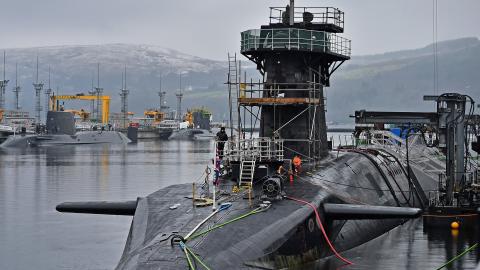With a fresh national security review underway in the UK, the new government’s stance on nuclear modernisation will have a significant impact on transatlantic relations and NATO's overall deterrence strategy.
As the UK's new Labour government conducts its national security review, its approach to nuclear modernisation will send a crucial message to the US. The UK's nuclear deterrent is not just a national asset; it is a cornerstone of NATO's collective defence strategy. How Labour navigates this issue will have far-reaching implications for transatlantic relations and the future of the Western alliance.
The importance of the UK's nuclear capabilities was recently underscored by the US Strategic Posture Commission. In its comprehensive report, the Commission emphasised the critical role of the UK's nuclear forces in maintaining NATO's deterrence posture. The report explicitly states: ‘The United Kingdom and France provide important nuclear forces that contribute to the NATO Alliance. The United Kingdom, in particular, contributes to deterrence and complicates adversary planning with its independent nuclear arsenal.’ This assessment highlights how the UK's submarine-based deterrent enhances the credibility of NATO's nuclear policy and presents additional strategic challenges for potential adversaries.
Prime Minister Keir Starmer has repeatedly emphasised the importance of maintaining the UK's nuclear deterrent. In a recent speech, he stated: ‘A strong, modernised nuclear capability is not just a pillar of our national defence – it's a cornerstone of our commitment to NATO and global security.’ This clear stance from the former opposition leader underscores the cross-party support for nuclear modernisation in the UK.
The commitment to nuclear modernisation was recently strengthened by the UK’s 2021 Integrated Review of Security, Defence, Development and Foreign Policy. In a bold move, the review announced an increase in the UK's nuclear weapon stockpile cap from 180 to 260 warheads. This decision demonstrated the UK's resolve and ability to be flexible in the face of evolving global threats.
Starmer has expressed support for this decision, noting: ‘In an increasingly unpredictable world, we must ensure our deterrent remains effective. The increase in our stockpile cap is a necessary step to safeguard our national security and uphold our NATO obligations.’
The UK's commitment to nuclear modernisation was further reinforced in March 2024 with the publication of ‘Delivering the UK's Nuclear Deterrent as a National Endeavour’. This strategic document reaffirms the critical importance of the nuclear deterrent to UK national security and outlines a comprehensive approach to resourcing and upgrading the country's nuclear capabilities.
Crucially, the paper emphasises several key points that underscore the UK's unique position in global nuclear deterrence. Firstly, it highlights that the UK is the only power besides the US that has pledged its nuclear deterrent to NATO, underscoring the UK's indispensable role in the alliance's overall deterrence strategy.
Secondly, the document recognises the UK's critical role in helping the US confront what it terms a ‘two peer problem’ – referring to the challenge posed by simultaneously deterring both Russia and China. It stresses that with the right support from the US, in line with historical agreements, the UK can play a pivotal part in addressing this complex geopolitical landscape.
Lastly, the paper acknowledges the significant challenges ahead and outlines a comprehensive response. Under the banner of a ‘National Endeavour,’ it proposes mobilising a wide set of measures to ensure the continued effectiveness and credibility of the UK's nuclear deterrent.
Starmer has praised this document, stating, ‘The March 2024 strategic review provides a clear roadmap for ensuring our nuclear forces remain cutting-edge and capable of meeting future challenges. Labour fully supports this forward-looking approach to our nuclear policy, recognising it truly as a national endeavour.’
As Labour now conducts its own national security review, it must carefully consider these key points and translate rhetorical assurances into concrete policy decisions and resource allocations. The review should build upon this foundation, exploring ways to further enhance the UK's nuclear capabilities and its contribution to NATO's deterrence posture.
One area where the UK could demonstrate its commitment to a robust nuclear deterrent is by considering the adoption of a nuclear capability outside its current Continual at-Sea Deterrent construct. Currently, the UK relies solely on its submarine-based Trident missiles. While this system has proven effective, diversifying the nuclear arsenal to include a second delivery method could enhance flexibility and resilience. The original Polaris Sales Agreement could serve as a model for future engagement and additional capability.
The signals sent by Labour's ongoing review will be particularly significant in the context of an increased emphasis on allied burden-sharing. A clear and unambiguous commitment from the UK to a fully resourced nuclear modernisation programme, to include a second delivery platform, would serve as a powerful demonstration of burden-sharing and alliance solidarity.
Moreover, a strong UK nuclear posture would help maintain strategic stability in an era of renewed great power competition. As Russia continues its aggressive behaviour and China rapidly expands its nuclear capabilities, the deterrent value of Western nuclear forces has only grown. The UK's nuclear arsenal, though smaller than that of the US or Russia, plays a vital role in this broader deterrence landscape.
The stakes are high, and the world will be watching closely. Translating the new prime minister’s rhetoric on nuclear modernisation into action and resources will help ensure the continued effectiveness of the Western deterrent and the stability of the transatlantic alliance for decades to come.
Read in Royal United Services Institute.
Enjoyed this article? Subscribe to Hudson’s newsletters to stay up to date with our latest content.



















